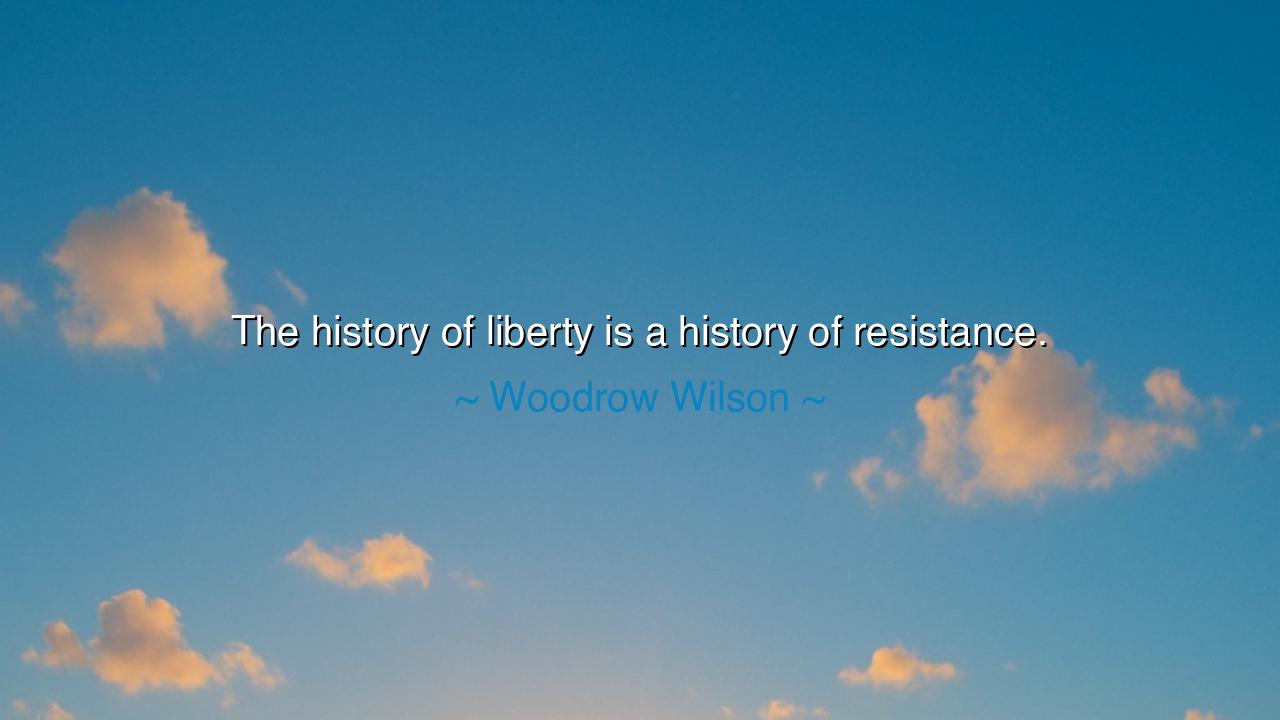
The history of liberty is a history of resistance.






“The history of liberty is a history of resistance.” Thus spoke Woodrow Wilson, the scholar-president, whose mind was steeped in the lessons of history and whose heart still trembled with the echoes of revolution. In these few words, he gave form to an eternal truth: that freedom is never given — it is taken, defended, and renewed through struggle. Liberty is not a quiet garden where peace grows undisturbed; it is a battlefield where the human spirit rises again and again against the forces that would bind it. Every age must fight anew for what is sacred, for tyranny is as constant as the tides, and only resistance keeps it from drowning the world.
When Wilson spoke these words, he was not merely describing the past — he was warning the future. He understood that the story of humanity is not one of rest, but of unceasing vigilance. Each generation inherits liberty as a fragile flame, and whether that flame endures depends on whether they have the courage to resist — to resist oppression, indifference, and even their own complacency. The history of liberty is therefore not written in ink, but in the blood, sweat, and voices of those who refused to yield. It is the record of souls who stood when others bowed, who spoke when silence was safe, who believed that conscience must always outweigh comfort.
We can trace this truth through the ages. The American Revolution, which birthed a nation of free people, began not in the halls of power but in the defiance of ordinary men and women. Farmers, printers, blacksmiths — they rose against a king not because they were mighty, but because they would not be silent. From Lexington to Yorktown, they fought not only for their homes but for an idea: that the governed have the right to resist the unjust. The same spirit burned in France, where the people stormed the Bastille and tore down centuries of tyranny. It burned in India, when Gandhi led millions in peaceful resistance, proving that even without weapons, the human will could conquer an empire. These are not separate stories — they are verses in the same hymn of liberty.
Yet resistance does not always wear the armor of war. Sometimes it speaks softly, through courage that endures rather than destroys. Consider Rosa Parks, who in 1955 refused to surrender her seat to a white man on a Montgomery bus. That single act of defiance became the spark that lit a movement. Her resistance was quiet but immovable, and through it she joined the long line of those who understood Wilson’s truth — that liberty lives only when it is defended. It was not power that gave Parks her strength, but principle. Her courage whispered to the world: injustice cannot withstand the steadfast soul.
But the heart of Wilson’s quote reaches even deeper — it speaks not only of nations, but of the soul itself. For within every man and woman lives a private tyranny: fear, doubt, apathy. And within every heart must rise a resistance. To be free is not only to live without chains, but to think without fear, to speak without deceit, to act without compromise. Each time you resist the temptation to remain silent when truth demands a voice, you are part of the same history of liberty that Wilson revered. The war for freedom is fought as much within as without.
The ancients understood this. The philosopher Epictetus, born a slave, taught that no man could enslave the free mind. Though his body was in chains, his spirit was unconquerable, for he had learned to resist the power of circumstance. In his strength, we see the timeless pattern: liberty begins in resistance — first against the tyrant outside, then against the tyrant within. The freest societies are built upon the freest souls.
And so, my children, take this teaching to heart: never cease to resist. When injustice rises, resist it. When falsehood spreads, speak the truth. When comfort tempts you into silence, remember the cost of every freedom you possess. For liberty is not a gift that endures by itself — it is a living covenant between the living and the dead, renewed each time a human being stands firm against oppression. The moment you grow still, liberty weakens; the moment you act, it lives again.
Therefore, let your life itself be a form of resistance — against ignorance, against fear, against all that would make you less than free. Be as those who came before you: steadfast, unyielding, and brave. For as long as there are hearts willing to resist, the story of liberty will never end — and the history of freedom will continue to be written, line by line, in courage.






AAdministratorAdministrator
Welcome, honored guests. Please leave a comment, we will respond soon